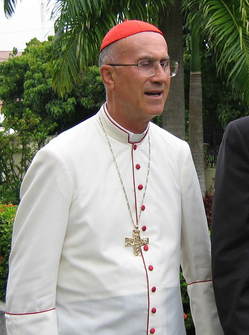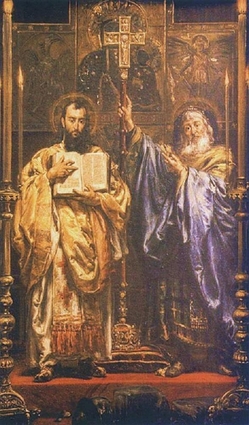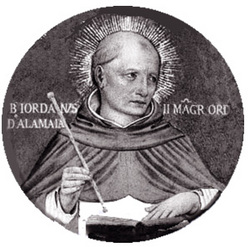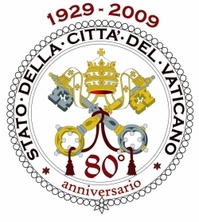 The Cardinal Secretary of State to His Holiness, Tarcisio Bertone was in Mexico from January 15 to 19 to preside over the 6th World Meeting of Families. While in Mexico the cardinal met with Mexico‘s president, Felipe Calderon Hinojosa and with representatives of culture.
The Cardinal Secretary of State to His Holiness, Tarcisio Bertone was in Mexico from January 15 to 19 to preside over the 6th World Meeting of Families. While in Mexico the cardinal met with Mexico‘s president, Felipe Calderon Hinojosa and with representatives of culture.
Bertone was interviewed by Carlo Di Cicco, deputy director of the Vatican newspaper, and Roberto Piermarini, director of the news service of the papal radio.
One of the relevant questions was on the family and culture why the cardinal gave substantial attention to these topics. What is good to keep before our eyes is the witness that BOTH family and culture can have for work in the Kingdom of God. In answer to this query, Cardinal Bertone said:
Because in reality, the family is the first transmitter of values and culture for the new generations; for children and young people growing up, the family is the transmitter of values. This is a proven fact in the experience of family life, despite all the difficulties that mark the way, not only in Europe but also in Latin America.
I recall a conference, a debate, that took place here in Rome, in the Basilica of St. John Lateran, with Professor Barbiellini Amidei, precisely about the family, regarding its capacity or incapacity to address other instances of socialization in the task of transmitting values.
In the end we agreed that the family is the first instance of the transmission of values — and this is also the conviction of the Popes: of John Paul II and, particularly, Pope Benedict, as taken up in the two messages addressed to Mexico — the family is the first instance of human and Christian formation.
It transmits the identity, the family’s own identity, and the cultural and spiritual identity of a people.
Then the state is born thanks to the grouping, the communion among families, that is why the state should have the mission to strengthen the identity of a people grounded in its roots, in its origins, which later determine the development of both the political and ecclesial community.
Regarding Culture the cardinal was asked: In the meeting with [people of] the world of culture and education you emphasized the limited success that Mexican culture had during the last century. Is it not a rather harsh judgment for a Church that suffered persecution, including a bloody one?
Cardinal Bertone: It is, in fact, a question of harsh judgment. I literally quoted an author, Gabriel Zaid, who remembers his meeting with a European bishop who asked him: “Is a Catholic culture possible in Mexico? Can the Catholic Church have some cultural influence in the country?”
When this European bishop, more precisely this Dutch bishop, asked him what could be expected of Mexico, Zaid, desolate, said: “I couldn’t give him any hope.
“In Mexico, beyond the vestiges of better times and popular culture, Catholic culture has ended” — you must realize that we were in the 70s — it remained on the margin, in one of the most notable centuries of Mexican culture: the 20th century. How could that happen? — Zaid replied — “I’m still asking myself that!”
This diagnosis is certainly pessimistic: I have taken it up again precisely because there have been incentives, highly significant positive aspects, so that it would be very unjust to stress the negative and subscribe fully to this diagnosis.
Nevertheless, the writer’s observation and the bishop’s question require an answer; they are stimulating.
That culture is necessary in the work of the Church, and even more so in humanity itself, was affirmed by Pope John Paul II, in his great address in UNESCO, when he cried out: “The future of man depends on culture! The peace of the world depends on the primacy of the Spirit! The peaceful future of humanity depends on love!” Thus he related peace, culture and love.
For the Church, cultural promotion is an innate reality, written in her DNA, in her history: It is an urgent and necessary imperative.
By the very fact that the Gospel is itself creator of culture, the proclamation of the Gospel is cultural creation.
The truth is that the Church in Mexico was persecuted and gave many martyrs. I received and venerated the relics of a 15-year-old boy, who looked much more mature than his age, José Sánchez del Río, who took part in a cultural circle of Catholic Action.
Despite his young age, he was arrested, and after his capture he was killed. Before dying, he wrote “Long Live Christ the King,” which was the cry of Mexican martyrs.
That is why Mexico‘s Church is certainly a martyr Church, but also because of this she has been marginalized. This Church has always practiced a great religion of worship, very significant, source of her fidelity to Christ and of her enthusiasm for the faith, but somewhat resigned from the cultural point of view. That is why it was and is necessary to re-launch the whole of cultural promotion that — as I said — is innate to the mission of the Church, particularly in Mexico.
 “Music, like art, can be a particularly great way to proclaim Christ because it is able to eloquently render more perceptible the mystery of the faith.” Music can “help us contemplate the intense and arcane mystery of Christian faith.”
“Music, like art, can be a particularly great way to proclaim Christ because it is able to eloquently render more perceptible the mystery of the faith.” Music can “help us contemplate the intense and arcane mystery of Christian faith.”




